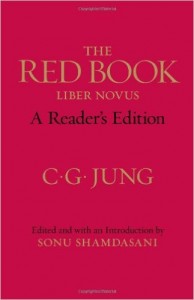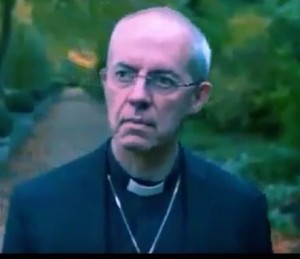I have just finished reading Jung’s Red Book, which is an extraordinary text. Only published since 2009, the Red Book is Jung’s personal record of a series of self-induced visions, which mainly took place between 1913 and 1917, together with Jung’s reflections and interpretations of them, which he continued to refine until about 1930. This book takes us to the core of the personal experience on which Jung drew more circumspectly in his psychological works. That experience is centrally one of integration, as Jung confronts the archetypal expressions of different aspects of himself – sometimes in reverence, sometimes in anger, but always with acceptance of his own multiplicity. The record of that experience often reads like a prophetic or religious text, and the religious language is full-throated and unabashed, but at the same time clearly placed in the framework of an ‘inner’ psychological rather than an ‘outer’ supernatural process.
I had at first thought to write a conventional review of the book, but on further consideration decided that this was not the best way of writing about it. For one thing, it is not a philosophical or scientific text: there is no argument in it. It is the record of an experience, and the main way I can assess that experience is by trying to share some of what I experienced as an incredible richness when reading it. It’s not so much a book that can be readily judged right or wrong in itself in any given respect, as one that you can engage in and find useful to a given degree in deepening your experiential understanding of integration and the Middle Way. So I don’t want to review it so much as share some readings of it. My plan is, instead, to write a series of blogs on different aspects of it. It is full of rich quotations, but ones that will nevertheless probably need interpretation.
This will be very much my reading of the Red Book rather than the one I would necessarily expect you to have. Obviously the meaning of any text varies with the reader, but this one most markedly so. I do think some readings are more helpful than others, but it is also easy to understand how such a rich and ambiguous text can give rise to very different readings. Jung’s own words reinforce such an impression:
There is only one way and that is your way.
You seek the path? I warn you away from my own. It can also be the wrong way for you.
May each go his own way. (p.125)
I do not interpret such words in terms of relativism. Some paths can be better for us than others, but Jung warns us against the assumption that we know what the best path is for someone else, or that we should assume someone else’s path is best for us. Jung was born in the nineteenth century, the son of a Swiss pastor, and it is unlikely that his path will very closely resemble most other people’s today. Nevertheless we can learn a good deal from it.
For the rest of this first blog I want to explore the central question of how far the Red Book reflects the Middle Way. I think the answer, obviously based on my own reading, is ‘quite closely’, though not without some caveats. The most important reason that it is about the Middle Way is that the whole text is about a process of integration (even though Jung does not use the word ‘integration’), and one cannot integrate two opposed beliefs or desires if one sees them in absolute terms. In a way the whole book wrestles with the question ‘What do God, the soul, the devil, the dead etc. mean when they are not absolute’? Simply by being recognised as aspects of the psyche subject to integration, they can no longer be absolute.
But I was also gratified to find several explicit mentions of the Middle Way in the text, all of which suggest that the Middle Way was central to Jung’s thinking, even if he did not develop it formally or philosophically in his other writings. There are three explicit mentions, plus of course a great many other points where the Middle Way is implicit.
The first explicit mention is very much in terms of the Christian Middle Way:
Divinity and humanity should remain preserved, if man should remain before the God, and the God remain before man. The high-blazing flame is the middle way: whose luminous course runs between the human and the divine. (p.289)
Here Christ is in a symbolic role as mediator between the absoluteness of the idea of God and the embodied situation of humans. Elsewhere Jung stresses the story of Christ ‘harrowing hell’ between his crucifixion and resurrection, to indicate the ways he symbolically unites heaven and hell, the heights and depths with human experience. If we can hold ideals in mind as meaningful at the same time as addressing the ordinary conditions of human life, we can internalise this symbolic Christ.
The second mention occurs in Jung’s conversation with a librarian, who represents the analytically-bound, scholarly, left-hemisphere-dominant aspect of Jung. Jung tries to moderate some of the librarian’s Nietzschean anti-Christian approach:
“…Like everything healthy and long-lasting, truth unfortunately adheres more to the middle way, which we unjustly abhor.” [Jung said]
“I really had no idea that you take such a mediating position.” [The librarian replied]
“Neither did I – my position is not entirely clear to me. If I mediate, I certainly mediate in a very peculiar manner.”
This suggests to me that, although Jung assumes the Middle Way a lot of the time, he never actually developed it explicitly in the way he is using it here (to avoid both extremes of a polarised intellectual debate). Perhaps he was afraid that public development of it was incompatible with the public reputation he wanted to cultivate as a scientist. But Jung’s corpus of writings is large and I have certainly not read it all, so I’d be happy to hear from anyone who’s come across a more explicit development of the Middle Way in Jung elsewhere.
The third explicit mention occurs in a discussion of ‘stretched hanging’ which Jung had experienced in a vision, hanging between heaven and hell. Again, Christ is the symbol of it.
To deliver the men of his time from the stretched hanging, Christ effectively took this torment upon himself and taught them “Be crafty like serpents and guileless like doves.” For craftiness counsels against chaos, and guilelessness veils its terrible aspect. Thus men could take the safe middle path, hedged both upward and downward.
But the dead of the Above and the Below mounted, and their demands grew ever louder. And both the noble and the wicked rose up again and , unaware, broke the law of the mediator. They flung open doors both above and below. They drew many after them to higher and lower madness, thereby sowing confusion and preparing the way that is to come. (p. 357)
The madness of the above here could be identified with what Buddhists call eternalism: the belief in positive absolutes such as God’s absolute existence and absolute command. The madness of the below, on the other hand, would involve nihilism, or the rejection of any moral judgement being better than another. The Middle Way requires craftiness not only in avoiding chaos, but also in avoiding rigid order, but guilelessness in making a straightforward response to the Middle Way itself.
‘The way that is to come’ here may be a reference to a recurring theme in the Red Book, which is the First World War (hardly surprising, since Jung’s visions either anticipated it or occurred during it). Jung clearly blames the ideological madness of the First World War on this kind of polarisation, and was well aware that Christians fought on both sides in absolute belief that God was on their side. Jung also writes elsewhere that “What stays in balance is correct, what disturbs balance is incorrect” (p.266), very much suggesting his moral commitment to avoiding this polarisation.
However, before leaving you with too unequivocal an impression of Jung’s relationship with the Middle Way, I must also mention some caveats. Obviously it is one thing to use the term ‘middle way’, and another to develop and apply a strong understanding of it which avoids any kind of appropriation by creeping metaphysical assumptions. As I’ve already mentioned, my impression so far is that although Jung’s understanding of integration was both profound and pioneering, its relationship to the Middle Way in his thinking was probably sketchier. The Red Book is also a very ambiguous text, which makes it pretty wide open to metaphysical readings, and I’m sure that the metaphysicians will already have been at work on it. In the comments section of my earlier ‘Middle Way Thinkers’ blog post on Jung, I have already had a discussion with ‘Gregory Wonderwheel’ who wanted to interpret Jung metaphysically.
It also has to be said that some of Jung’s own tendencies encourage such metaphysical readings. He is pretty incautious with the terms he uses throughout – basically he will take almost any terms from traditional religion (including ‘truth’, ‘knowledge’, ‘redemption’ and ‘revelation’) and trust entirely that the context will safeguard such language against absolutizing interpretation. For this reason, beware of apparently absolutizing Jung quotes taken out of context. Near the end of the book, too, his ‘Seven Sermons to the Dead’ seem to come close to offering us a metaphysical scheme (of the ‘Pleroma’, which is nothing and everything) based on that of Gnosticism, most of which seems to bear no relationship to any practical application. At the same time, these sermons are hedged around with the kind of disavowals that seem familiar from Buddhism (‘It is fruitless to think about the Pleroma’ – p.510). As with Emptiness talk in Buddhism, I often just want to shout back in frustration, ‘Well, why are you thinking about it then?’ Whether Jung’s gnostic cosmology is metaphysical or not is entirely a matter of contextual judgement, but it certainly threatens to turn into a diversion if one wants to use the Red Book as a text supportive of the Middle Way.
Such caveats should not be off-putting on balance. The Red Book is overwhelmingly experiential in most of its course, and there is a great deal more to say about it – for example, about the riches of its approach to God, to evil, to gender, to death, to Christianity, to the eucharist, to pride and humility, to power, to the individual and the group, to embodiment, to language, and to symbols. But all of these other themes will have to wait for other blogs.

